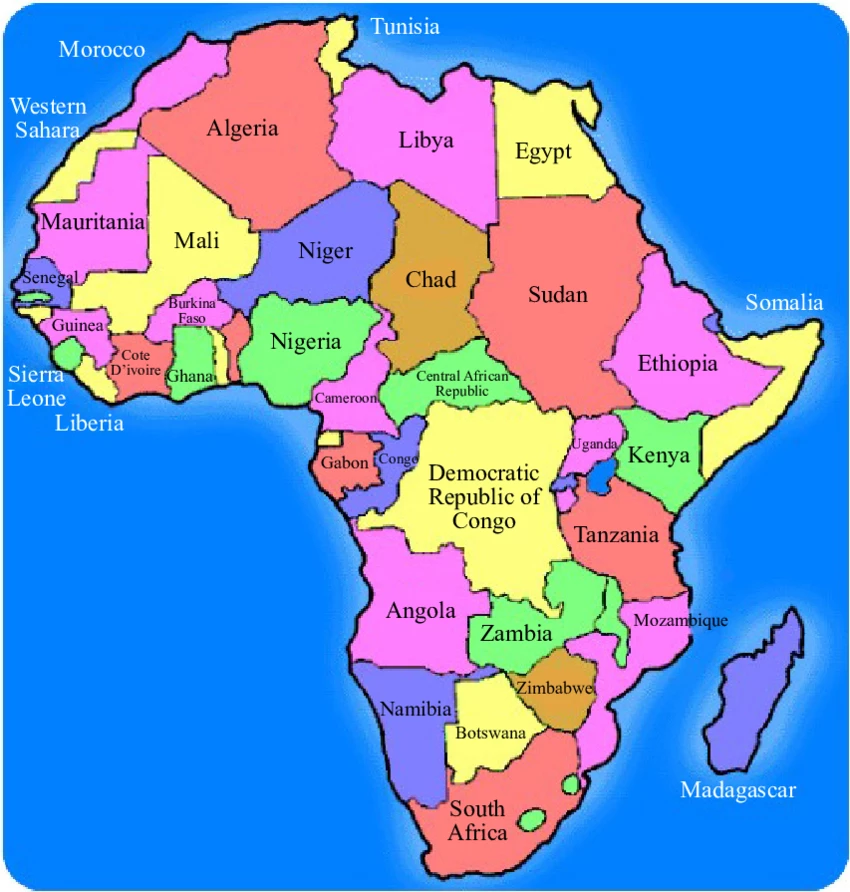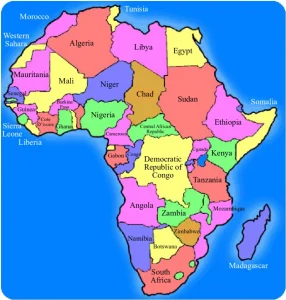
Founding Fathers of the 54 African Countries
The African continent is home to 54 sovereign nations, each with its own history of struggle, liberation, and leadership. The road to independence was long and complex, shaped by colonization, resistance movements, and the vision of men and women who dedicated their lives to freedom.
 These leaders—often referred to as the founding fathers of Africa’s nations—stood as the faces of independence movements, negotiated transitions to self-rule, or laid the political foundation of their countries. Some were revolutionaries, some were diplomats, others monarchs, but all remain pivotal figures in their nations’ histories.
These leaders—often referred to as the founding fathers of Africa’s nations—stood as the faces of independence movements, negotiated transitions to self-rule, or laid the political foundation of their countries. Some were revolutionaries, some were diplomats, others monarchs, but all remain pivotal figures in their nations’ histories.
Below is a country-by-country look at the founding fathers or key independence leaders of the 54 African countries.
North Africa
Algeria
- Ahmed Ben Bella – First President after independence from France in 1962.
- Houari Boumédiène – Revolutionary leader and key figure in the FLN.
- Ferhat Abbas – Political leader who advocated for independence.
Egypt
- Saad Zaghloul – Leader of the 1919 revolution against British rule.
- Gamal Abdel Nasser – Military officer, pan-Arabist, and second President of Egypt, who consolidated independence.
Libya
- Omar Mukhtar – Hero of resistance against Italian colonization.
- King Idris – Libya’s first monarch after independence in 1951.
- Muammar Gaddafi – Overthrew Idris in 1969 and became the dominant figure in Libya’s post-independence history.
Morocco
- Sultan Mohammed V – Symbol of independence and national unity.
Sudan
- Ismail al-Azhari – First Prime Minister of independent Sudan (1956).
- Ali Abd al-Latif – Early nationalist who inspired Sudanese independence.
Tunisia
- Habib Bourguiba – Leader of the Neo Destour party, “Father of Tunisian independence.”
West Africa
Benin
- Hubert Maga – First President after independence from France in 1960.
Burkina Faso
- Maurice Yaméogo – First President (1960).
- Thomas Sankara – Later revolutionary leader known as “Africa’s Che Guevara.”
Cape Verde
- Amílcar Cabral – Revolutionary leader who fought for independence of Cape Verde and Guinea-Bissau.
Côte d’Ivoire (Ivory Coast)
- Félix Houphouët-Boigny – First President and architect of Ivorian independence.
The Gambia
- Dawda Jawara – First President after independence from Britain in 1965.
Ghana
- Kwame Nkrumah – Visionary pan-Africanist, first Prime Minister and President. Ghana became the first sub-Saharan African country to gain independence (1957).
Guinea
- Ahmed Sékou Touré – First President who boldly rejected French colonial ties in 1958.
Guinea-Bissau
- Amílcar Cabral – Founder of PAIGC, fought Portuguese rule, regarded as the father of independence.
Liberia
- Joseph Jenkins Roberts – First President of Liberia (1848), an independent republic long before most of Africa.
Mali
- Modibo Keïta – First President and key figure in independence from France in 1960.
Mauritania
- Moktar Ould Daddah – First President after independence from France in 1960.
Niger
- Hamani Diori – First President after independence from France in 1960.
Nigeria
- Nnamdi Azikiwe – First President of Nigeria.
- Ahmadu Bello – Premier of Northern Nigeria, influential nationalist.
- Obafemi Awolowo – Leading statesman and nationalist thinker.
Senegal
- Léopold Sédar Senghor – Poet, philosopher, and first President of Senegal.
Sierra Leone
- Milton Margai – First Prime Minister after independence from Britain in 1961.
Togo
- Sylvanus Olympio – First President, symbol of independence from France in 1960.
Central Africa
Angola
- Agostinho Neto – Poet and first President after independence in 1975.
Cameroon
- Ahmadou Ahidjo – First President after independence in 1960.
- Ruben Um Nyobé – Nationalist leader and anti-colonial activist.
Central African Republic
- Barthélemy Boganda – Visionary leader regarded as the father of independence.
Chad
- François Tombalbaye – First President after independence in 1960.
Democratic Republic of the Congo
- Patrice Lumumba – First Prime Minister, martyr of African liberation.
- Joseph Kasavubu – First President of independent Congo.
Equatorial Guinea
- Francisco Macías Nguema – First President after independence from Spain in 1968.
Gabon
- Léon M’ba – First President of Gabon.
Republic of Congo (Brazzaville)
- Fulbert Youlou – First President after independence in 1960.
São Tomé and Príncipe
- Manuel Pinto da Costa – First President after independence from Portugal in 1975.
East Africa
Burundi
- Prince Louis Rwagasore – Nationalist hero and independence leader.
Comoros
- Ahmed Abdallah – First President after independence from France in 1975.
Djibouti
- Hassan Gouled Aptidon – First President, in office from 1977 to 1999.
Eritrea
- Isaias Afwerki – Leader of EPLF, became first President in 1993 after independence from Ethiopia.
Ethiopia
- Emperor Menelik II – Unified Ethiopia and defeated Italy at the Battle of Adwa (1896).
- Emperor Haile Selassie – Modernizer and global voice for Africa in the League of Nations and UN.
Kenya
- Jomo Kenyatta – First Prime Minister and President after independence in 1963.
Madagascar
- Philibert Tsiranana – First President after independence from France in 1960.
Malawi
- Hastings Kamuzu Banda – First President after independence in 1964.
Mauritius
- Seewoosagur Ramgoolam – First Prime Minister, considered the “Father of the Nation.”
Mozambique
- Samora Machel – Leader of FRELIMO and first President after independence in 1975.
Rwanda
- Grégoire Kayibanda – First President after independence in 1962.
Seychelles
- James Mancham – First President.
- France-Albert René – Long-serving leader after a coup in 1977.
Somalia
- Aden Abdullah Osman Daar – First President of Somalia.
- Mohamed Siad Barre – Later military ruler.
South Sudan
- John Garang – Founding leader of SPLM, symbol of independence struggle.
- Salva Kiir – First President after independence in 2011.
Tanzania
- Julius Nyerere – Leader of Tanganyika, first President after unification.
- Abeid Amani Karume – Leader of Zanzibar and co-founder of Tanzania.
Uganda
- Milton Obote – First Prime Minister and later President.
- Kabaka Mutesa II – First President (largely symbolic head of state).
Southern Africa
Botswana
- Seretse Khama – First President, highly respected leader.
Eswatini (Swaziland)
- King Sobhuza II – Absolute monarch who led the country to independence in 1968.
Lesotho
- King Moshoeshoe II – Symbol of unity and monarchy.
- Leabua Jonathan – First Prime Minister.
Namibia
- Sam Nujoma – Long-time SWAPO leader, first President after independence in 1990.
South Africa
- Nelson Mandela – Anti-apartheid icon and first democratically elected President (1994).
- Earlier leaders include John Dube (first ANC president) and Albert Luthuli (Nobel Peace Prize laureate).
Zambia
- Kenneth Kaunda – First President, led independence from Britain in 1964.
Zimbabwe
- Robert Mugabe – First Prime Minister and later President.
- Joshua Nkomo – Liberation leader and founder of ZAPU.
Conclusion
The stories of Africa’s founding fathers reflect the continent’s resilience, unity, and determination. Many of these leaders dreamed not only of freedom for their nations but of a united Africa, bound by solidarity and shared destiny. Their legacies continue to shape Africa’s political, social, and economic journey today.
